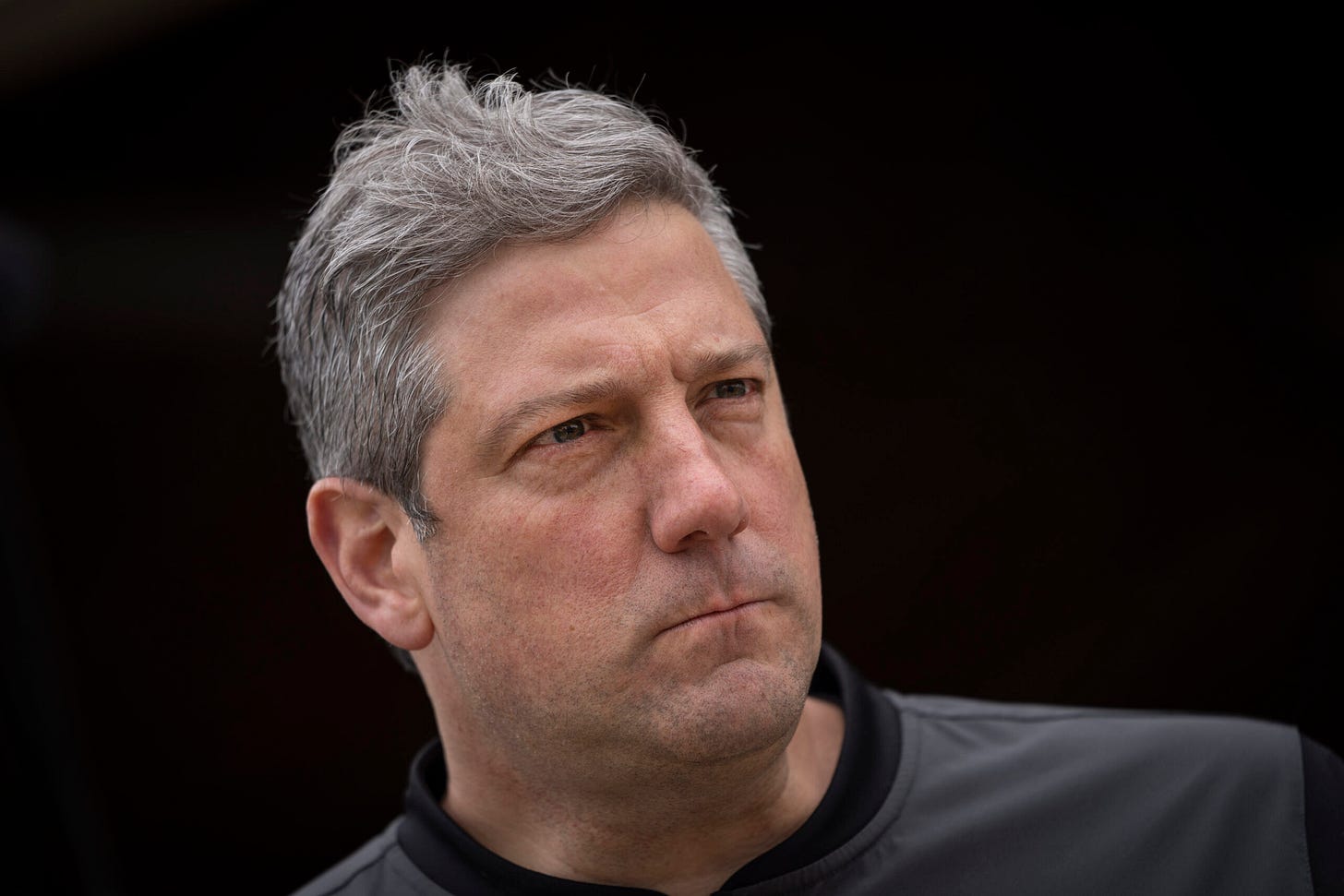
Tim Ryan’s Alpha Maneuver
If Trump insists on being the ultimate alpha male, what does that make all of his supporters?

At least one Democrat has started to figure out how to exploit a GOP weakness. He’s Tim Ryan, who is running against J.D. Vance for Ohio’s open U.S. Senate seat. Ohio should be a romp for Vance, as Trump won the state in 2020 by 8 points. Instead, the race appears tight.
What has Ryan figured out? He’s calling out Vance as a beta male.
Look, in a different world—say, the planet Vulcan—where the inhabitants, like Mr. Spock, were unburdened by primitive passions and instincts, everyone would make decisions about political candidates based entirely upon rational policy choices. But that’s not how human beings operate. Part of politics is about policies, of course. But beneath the surface—and these days, not very far beneath the surface—political combat partakes of the dog park. There are rituals of alpha dominance and beta submission.
Recall that in July 1988, Massachusetts Governor Michael Dukakis was running 17 points ahead of Vice President George H.W. Bush. Nothing crashed his numbers more surely than his response to a debate question. CNN’s Bernard Shaw, noting the governor’s opposition to the death penalty, asked whether, if Dukakis’s wife, Kitty, were raped and murdered, he thought he might change his view. Dukakis responded: “No, I don’t, Bernard, and I think you know that I’ve opposed the death penalty during all of my life. I don’t see any evidence that it’s a deterrent and I think there are better and more effective ways to deal with violent crime.”
Now, granted, it was a bad question, because all of us would respond with rage if someone we loved were raped and murdered and that’s not the best way to make policy. You wouldn’t trust someone devastated by grief and fury to make considered judgments. So Dukakis’s answer was perfectly appropriate as a policy matter—but it was a disaster as a political matter. Voters thought he was some sort of machine bereft of human feelings.
Later, the wonky Dukakis sought to shore up his tough-guy credibility by taking a disastrous ride in a tank, which made the diminutive governor look like a cross between Snoopy and Mr. Magoo. The election was essentially over.
Candidates have long performed at two levels in debates, parrying and thrusting about issues but also asserting dominance in mammalian code. In 2000, Al Gore and George W. Bush were seated on chairs without lecterns for a townhall-style debate. At one point, as Bush was speaking, Gore strode over to his side of the stage and right into Bush’s personal space. Bush looked at him and gave him a curt nod as if to say “I see what you’re doing and it’s not working.”
So voters want their leaders to be assertive and commanding. That has always been the case and in recent decades, before the Trump era, it was kept within reasonable bounds. Trump, of course, made the subtext the headline, proclaiming, “I alone can fix it,” and claiming to be the smartest, toughest, wealthiest, savviest, most capable leader the world had ever seen. Like his hero, Putin, who posed shirtless on horseback and with big game “kills,” Trump took the alpha posturing to absurd lengths. Actually, if Trump had merely pretended to kill tigers it would have been less offensive than his promises to commit war crimes (such as targeting the families of terrorists).
It remains a mystery that these absurd boasts by the most obviously insecure manchild in living memory were not met with the ridicule they deserved. But here we are. Trump’s image as some sort of Rambo persists with his most perfervid followers, and even some non-MAGAites continue to see him as strong. But there’s a trapdoor here for Republicans—and Tim Ryan has recognized it.
Most Democrats have responded to the Trump alpha gorilla routine by reminding voters that he’s dangerous and unhinged, and that he has violated norms essential to civil society, legitimate governance, and ordinary decency. That’s fine as far as it goes. It’s all true. But in the process of strutting as cock of the walk, Trump has emasculated every other Republican. He may look strong, but he demands that every other Republican become weak in his service. That satisfies (or partially satiates) Trump’s need for obeisance. But it presents a problem for the toadies who want to be considered leaders too.
Men like Kevin McCarthy, Ted Cruz, and Marco Rubio have abased themselves to remain in Trump’s good graces. Cruz performed one of the most humiliating kowtows, tamely accepting insults to his wife’s appearance to say nothing of Trump’s lunatic assertion that Cruz’s father had a role in the Kennedy assassination. They all hold their manhoods cheap. And because Trump is vindictive, petty, and cruel, he couldn’t resist reminding an Ohio audience last month that J.D. Vance, the candidate he had come to support, but who had once been a Trump critic, was “kissing my ass.”
At their first debate on Monday, Ryan took the shot. Reminding viewers that he had stood up to leaders of his own party, including Nancy Pelosi and Bernie Sanders, he noted that Vance was such a Trump lackey that even Trump had described it in those terms. Pressing the point, he recalled that even after Trump had “taken his dignity away from him,” Vance had returned to the stage to shake Trump’s hand and smile for the camera. Hitting the everyman theme, Ryan offered, almost with pity, that “I don’t know anyone I grew up with, anyone I went to high school with, who would allow someone to take their dignity like that and then get back on stage.”
Ryan thus simultaneously elevated his own alpha status while reinforcing Vance’s weakness. Every Republican who has bent the knee to Trump—male or female—is vulnerable in this way. Ryan has taught Democrats something.










